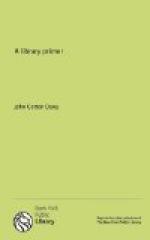Per cent. General works .04 Philosophy .01 Religion .02 Sociology .09 Philology .01 Science .08 Useful arts .06 Fine arts .04 Literature .12 Biography .10 History .13 Travels .10 Fiction .20 ____ Total 100
Local interest should be fostered by buying freely books on local history and science and books by local authors.
The librarian should keep informed of coming events, and see that the library is provided with the books for which there is sure to be a future demand. He should avoid personal hobbies and be impartial on all controversial questions. He should not be overconfident in his knowledge of what will elevate and refine the community.
It is better to buy 10 extra copies of a wholesome book wanted by the public than one copy each of 10 other books which will not be read.
Do not waste time, energy, and money—certainly not in the early days of the library—in securing or arranging public documents, save a few of purely local value. Take them if offered and store them.
Do not be too much impressed by the local history plea, and spend precious money on rare volumes or old journals in this line.
Certain work can judiciously be done toward collecting and preserving materials for local history that will involve neither expense nor much labor, and this the librarian should do. Do not turn the public library, which is chiefly to be considered as a branch of a live, everyday system of popular education, into a local antiquarian society; but simply let it serve incidentally as a picker-up of unconsidered trifles. A wide-awake, scholarly librarian will like his town, and delight in at least some study of its antecedents. And such a librarian need not be a crank, but must needs be an enterprising, wide-awake, appreciative student, who can scent the tastes and needs of posterity.
Put no money into rare books. A book which was out of print 10 years or 200 years ago, and has not insisted upon republication since, has, ordinarily, no place in the active, free public library. If you get it, sell it and buy a live book.
The free public library should encourage its readers to suggest books not in the library, by providing blanks for that purpose, and paying courteous attention to all requests.
Ask by letter, by circulars, and by notes in the local papers, for gifts of books, money, and periodicals. Acknowledge every gift. Remember that one who has helped the library, be it ever so little, has thereby become interested in it, and is its friend.
CHAPTER XII
Reference books for a small library, compiled by C.A. Baker, of the Public library, Denver
This list includes about 75 books, costing about $550. It is arranged alphabetically. It is subdivided into four lists, arranged according to relative importance. This subdivision is shown by the numbers prefixed to each entry.




